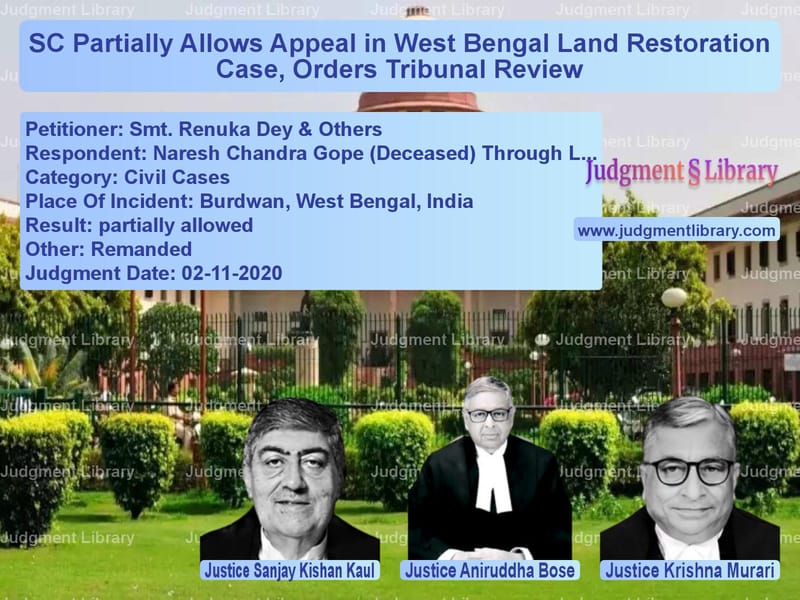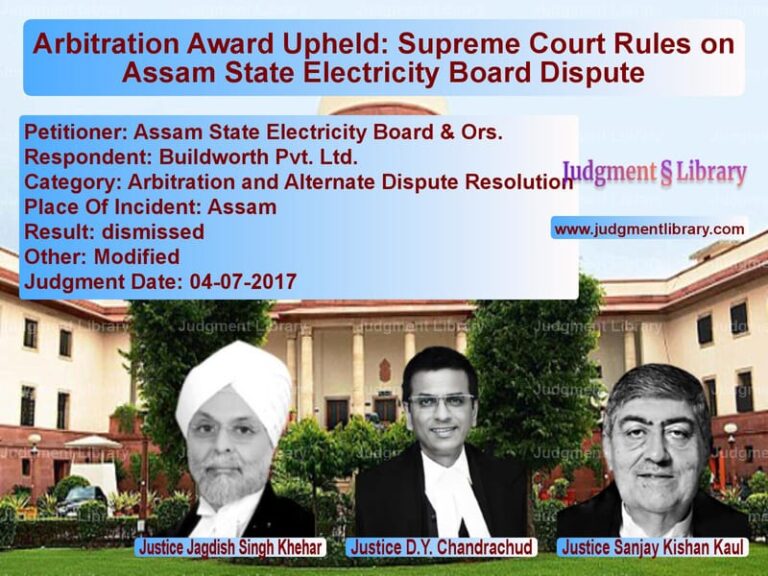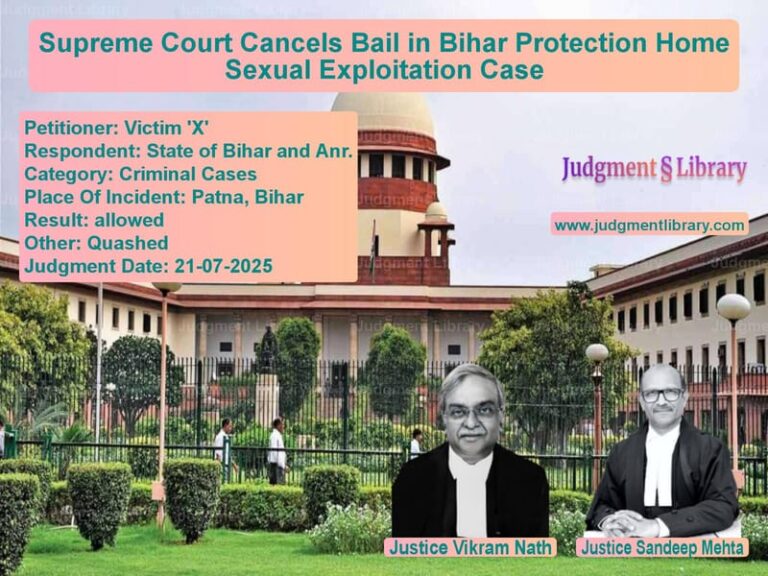SC Partially Allows Appeal in West Bengal Land Restoration Case, Orders Tribunal Review
The Supreme Court of India partially allowed an appeal in a long-standing land dispute concerning the restoration of alienated land under the West Bengal Restoration of Alienated Land Act, 1973. The case revolved around the claim of the appellants, led by Renuka Dey, seeking the return of land they had sold in 1968 due to financial distress. The Court remanded the case to the Land Reforms and Tenancy Tribunal to determine whether the land fell within the purview of the 1973 Act.
Background of the Case
The appellants had conveyed 31 decimals of land in Burdwan district, West Bengal, to Naresh Chandra Gope in 1968 for Rs. 9,500. The land included parts of a pond and garden. At the time of sale, the appellants stated in the sale deed that the transaction was carried out to cover education expenses, repay loans, and fund a sister’s marriage. On the same day, a separate agreement for reconveyance of the land was executed, allowing the appellants to repurchase the property within two years.
In 1974, the appellants applied for restoration of the land under the 1973 Act, citing financial distress. The Special Officer allowed the restoration, ordering the appellants to refund the sale proceeds with interest. The appellate authority and the West Bengal Land Reforms and Tenancy Tribunal upheld this decision. However, the High Court of Calcutta overturned the ruling, stating that the land was non-agricultural and did not qualify for restoration under the 1973 Act.
Arguments by the Appellants
Renuka Dey and other appellants, represented by their counsel, argued:
- The sale was made under financial distress, fulfilling the conditions of Section 4(1) of the 1973 Act.
- The land included a pond and was used for livelihood, qualifying as agricultural land under the Act.
- The simultaneous execution of a reconveyance agreement demonstrated the intention to reclaim the land.
- The High Court failed to consider the findings of the statutory authorities, which had ruled in their favor.
Arguments by the Respondents
The respondents, successors of the original purchaser, countered:
- The land was homestead and not agricultural, excluding it from the Act’s applicability.
- The appellants had purchased other land with the sale proceeds, showing that they were not in distress.
- The High Court correctly determined that the Tribunal failed to examine the nature of the land before ordering restoration.
- The provisions of the 1973 Act did not apply to general property transactions, and only agriculturists could seek restoration.
Supreme Court’s Observations
The Supreme Court analyzed the case in detail and made the following observations:
1. Distress Sale Condition Was Met
The Court noted that the sale proceeds were primarily used for livelihood and loan repayment, satisfying the conditions of Section 4(1)(a) of the 1973 Act.
“The reasons cited by the vendors for selling the land clearly show that they were in need of money. This qualifies as a transaction made in need of money for the maintenance of the transferor and his family.”
2. Applicability of the 1973 Act
The Court reaffirmed that land under the 1973 Act includes agricultural land, homestead, tanks, and wells. However, it ruled that homestead land must be connected to agricultural activities to be eligible for restoration.
“Homestead land, when included within the meaning of ‘land’ in the 1973 Act, means the homestead of an agriculturist and not any non-agricultural structure.”
3. High Court Erred in Dismissing the Case
The Supreme Court disagreed with the High Court’s finding that the transaction did not constitute a distress sale. It ruled that the statutory authorities had correctly determined the distress condition.
“The Tribunal and lower authorities had examined the financial hardship of the transferors, which was ignored by the High Court.”
4. Need for Fresh Determination of Land Use
The Court found that the Tribunal had not sufficiently examined whether the land met the definition under the 1973 Act. It remanded the case for further inquiry.
“The Tribunal shall undertake an inquiry to determine whether the land falls within the ambit of the 1973 Act, considering its use and nature.”
Final Judgment
The Supreme Court issued the following directives:
- The case was remanded to the Land Reforms and Tenancy Tribunal for fresh determination of the land’s nature.
- If the Tribunal finds that the land falls under the 1973 Act, the restoration order shall be reinstated, requiring the appellants to refund the sale price with interest.
- If the land is found to be non-agricultural, the appellants will have no claim under the Act, and the 1968 sale deed will remain valid.
- The Tribunal was instructed to conclude its determination within four months.
Conclusion
This ruling clarifies the applicability of the 1973 Act in land restoration cases, particularly regarding the definition of agricultural land. By remanding the case, the Supreme Court ensured that statutory authorities thoroughly examine the nature of the land before ordering restoration. The judgment provides relief to landholders seeking restoration under the Act while reinforcing that only agriculturists meeting specific criteria can benefit from its provisions.
Petitioner Name: Smt. Renuka Dey & Others.Respondent Name: Naresh Chandra Gope (Deceased) Through LRs & Another.Judgment By: Justice Sanjay Kishan Kaul, Justice Aniruddha Bose, Justice Krishna Murari.Place Of Incident: Burdwan, West Bengal, India.Judgment Date: 02-11-2020.
Don’t miss out on the full details! Download the complete judgment in PDF format below and gain valuable insights instantly!
Download Judgment: Smt. Renuka Dey & Ot vs Naresh Chandra Gope Supreme Court of India Judgment Dated 02-11-2020.pdf
Direct Downlaod Judgment: Direct downlaod this Judgment
See all petitions in Property Disputes
See all petitions in Succession and Wills
See all petitions in Landlord-Tenant Disputes
See all petitions in Judgment by Sanjay Kishan Kaul
See all petitions in Judgment by Aniruddha Bose
See all petitions in Judgment by Krishna Murari
See all petitions in partially allowed
See all petitions in Remanded
See all petitions in supreme court of India judgments November 2020
See all petitions in 2020 judgments
See all posts in Civil Cases Category
See all allowed petitions in Civil Cases Category
See all Dismissed petitions in Civil Cases Category
See all partially allowed petitions in Civil Cases Category







